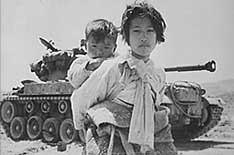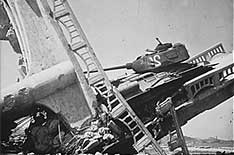Two days after the war in Korea began, the U.S., worried that it would “lose” Korea like China to communists, took the matter to the UN Security Council. (President Harry Truman decided that, as a “bandit incursion,” the war was not a matter for Congress.) Boycotted by the Soviet Union, the Council passed a resolution condemning North Korea’s action and calling on UN members to bring the hostilities to an end.
Critics would charge that the UN operation was nothing more than a U.S. military campaign in masquerade. Under the UN-mandated command of General Douglas MacArthur, commander-in-chief of U.S. forces in the Far East, American troops landed on September 15, 1950 at Inchon, a port city in western Korea, cutting off North Korean forces in the middle. UN forces at Pusan then charged from the south. Joining up with MacArthur, the combined group regained control of Seoul on September 28 and stormed northwards.
Taken by surprise, Kim Il Sung called “a great strategic retreat.” South Korea’s Rhee hailed MacArthur as “the savior of our race.” The opening months of the struggle had cost some 111,000 South Korean lives, destroyed 314,000 homes, and left 57,000 people missing. U.S. dead totaled 6,954, with 13,659 wounded. It was only the beginning.
Technically, the UN command had fulfilled its mission: restoring the sovereignty of South Korea. But with North Korean forces on the run, the chance of ridding Korea altogether of its communist leaders loomed large for the U.S. Washington was using the new foreign policy of containment, which argued that communist governments would eventually collapse if they could not expand into other countries, to justify the war. After the triumph of Mao Zedong in China 1949, toppling the regime of Kim Il Sung in North Korea was a chance Washington found too good to pass up.
South Korean forces crossed the 38th parallel into North Korea on September 28. Eleven days later, MacArthur, who had once declared that he would defend Korea from communists “as I would California,” followed. It would prove a fateful step.
- Previous: June 1950 War Breaks Out
- Next: Fall 1950 China Responds




